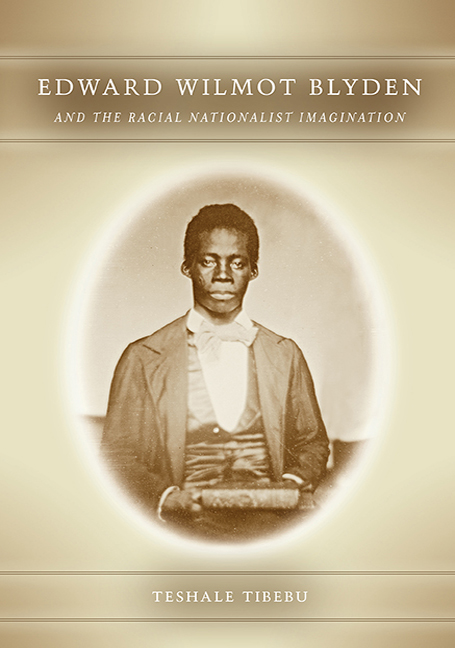Book contents
- Frontmatter
- Dedication
- Contents
- Acknowledgments
- Introduction
- 1 Africa: Service, Suffering, and Subjection
- 2 The Critique of Eurocentrism
- 3 Ishmael in Africa: Black Protestant Islamophilia
- 4 The African American “Civilizing Mission”
- 5 The “Mulatto” Nemesis
- 6 Appraising the Colonial Enterprise
- Epilogue: Post-Blydenian Reflections
- Notes
- Bibliography
- Index
2 - The Critique of Eurocentrism
Published online by Cambridge University Press: 08 April 2017
- Frontmatter
- Dedication
- Contents
- Acknowledgments
- Introduction
- 1 Africa: Service, Suffering, and Subjection
- 2 The Critique of Eurocentrism
- 3 Ishmael in Africa: Black Protestant Islamophilia
- 4 The African American “Civilizing Mission”
- 5 The “Mulatto” Nemesis
- 6 Appraising the Colonial Enterprise
- Epilogue: Post-Blydenian Reflections
- Notes
- Bibliography
- Index
Summary
Whatever others may do for us, there are some things we must do for ourselves.
—Blyden, Christianity, Islam, and the Negro RaceBlyden was one of the first black intellectuals to formulate a systematic critique of Eurocentrism long before the term itself came to use. This critique centered on culture, including education. Blyden sees the education of the black Christian in the Western world, unlike that of the Muslim counterpart in Africa, as defective, an example of the “mis-education of the Negro.” As he puts it in Christianity, Islam, and the Negro Race, “The Negro in Christian lands, however learned in books, cannot be said to have such a thing as self-education. His knowledge, when brought to the test, often fails him. And why? Because he is taught from the beginning to the end of his book-training … not to be himself, but somebody else.” He declares, “From the lessons he every day receives, the Negro unconsciously imbibes the conviction that to be a great man he must be like the white man. He is not brought up to be the companion, the equal, the comrade of the white man, but his imitator, his ape, his parasite.” He further writes, “To be as like the white man as possible—to copy his outward appearance, his peculiarities, his manners, the arrangement of his toilet, that is the aim of the Christian Negro—this is his aspiration. The only virtues which under such circumstances he develops are, of course, the parasitical ones” (44).
Blyden was a vehement critique of the phony imitation of whites by blacks. He writes, “Imitation is not discipleship… . A disciple, when freed from leading-strings, may become a producer; an imitator never rises above a mere copyist. With the disciple progress is from within; the imitator grows by accretion from without. The learning acquired by a disciple gives him capacity; that gained by an imitator terminates in itself. The one becomes a capable man; the other is a mere sciolist” (44). He hammers hard on the “incubus of imitation”:
One fatal drawback to the Negro in America is the incubus of imitation. He must be an imitator; and imitators see only results—they never learn processes.
- Type
- Chapter
- Information
- Publisher: Boydell & BrewerPrint publication year: 2012

